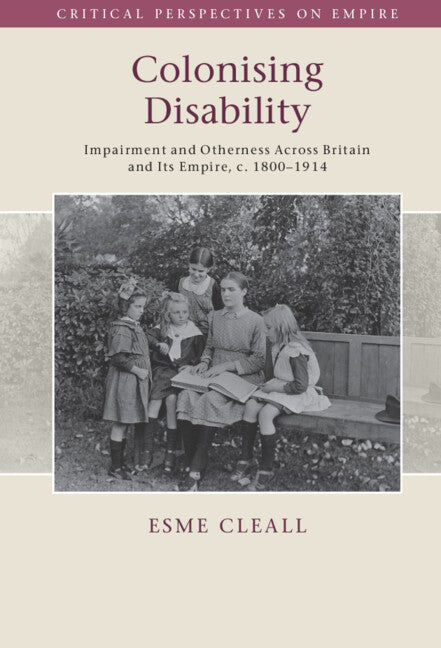Freshly Printed - allow 8 days lead
Couldn't load pickup availability
Colonising Disability
Impairment and Otherness Across Britain and Its Empire, c. 1800–1914
The first monograph on the construction and treatment of disability across Britain and its Empire from 1800 to 1914.
Esme Cleall (Author)
9781108833912, Cambridge University Press
Hardback, published 4 August 2022
310 pages
23.5 x 15.9 x 2.1 cm, 0.6 kg
'The dearth of published scholarship on nineteenth-century disability discourses and experiences in the British Empire is a well-known problem in our understanding of crucial cultural histories. Cleall's stunning research achievement meets this need with specific attention to discourses of disability, race, gender, and class in the British Empire: mutually inflecting and reinforcing constructions of 'difference' with pervasive and longstanding effects on the distribution of social goods. The book is a stunning research achievement and resource, but what may be even more compelling about it is Cleall's ability to situate the work in context of the disciplinary histories that inform it. Her care in articulating the necessary limits of this ambitious volume notwithstanding, the book is a major contribution towards generative change in multiple fields, including the anti-ableist, anti-racist undisciplining of colonial studies and disability studies. Its significance cannot be overstated.' Martha Stoddard Holmes, California State University
Colonising Disability explores the construction and treatment of disability across Britain and its empire from the nineteenth to the early twentieth century. Drawing on a wide range of sources, Esme Cleall explores how disability increasingly became associated with 'difference' and argues that it did so through intersecting with other categories of otherness such as race. Philanthropic, legal, literary, religious, medical, educational, eugenistic and parliamentary texts are examined to unpick representations of disability that, overtime, became pervasive with significant ramifications for disabled people. Cleall also uses multiple examples to show how disabled people navigated a wide range of experiences from 'freak shows' in Britain, to missions in India, to immigration systems in Australia, including exploring how they mobilised to resist discrimination and constitute their own identities. By assessing the intersection between disability and race, Dr Cleall opens up questions about 'normalcy' and the making of the imperial self.
1. Introduction: Thinking about disability, rethinking difference
2. Disability and Otherness in the British Empire: disablement as a discourse of difference
3. Saving the other at home and overseas: philanthropy, education and the state
4. 'A Fearfully and wonderfully made individual': exhibiting bodily anomaly
5. Signs of Humanity: Language and Civilisation
6. A Deaf Imaginary: disability, nationhood and belonging in the 'British World'
7. Immigration: racism, ableism and exclusion
8. The health of the nation: class, race, gender and disability in imperial Britain
Conclusion
Bibliography
Index.
Subject Areas: History of medicine [MBX], British & Irish history [HBJD1]


